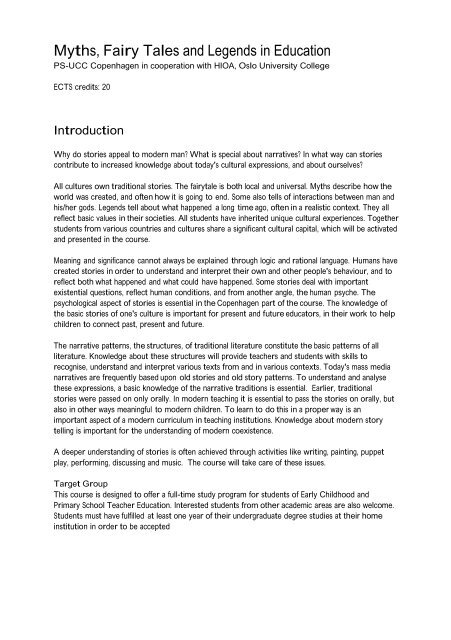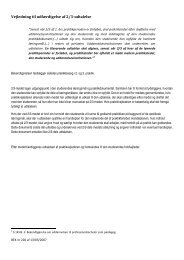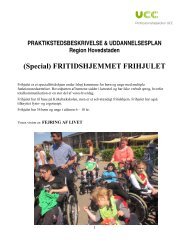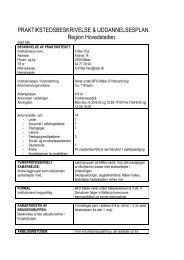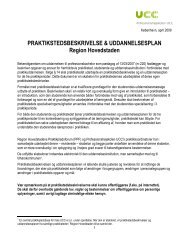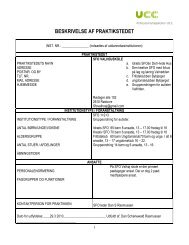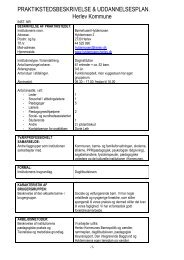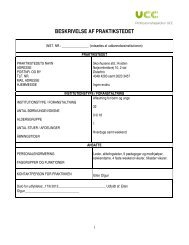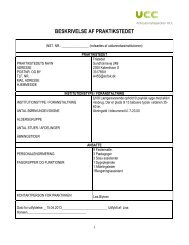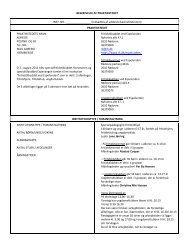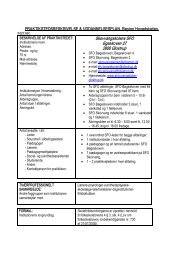Myths, Fairy Tales and Legends in Education
Myths, Fairy Tales and Legends in Education
Myths, Fairy Tales and Legends in Education
Create successful ePaper yourself
Turn your PDF publications into a flip-book with our unique Google optimized e-Paper software.
<strong>Myths</strong>, <strong>Fairy</strong> <strong>Tales</strong> <strong>and</strong> <strong>Legends</strong> <strong>in</strong> <strong>Education</strong><br />
PS-UCC Copenhagen <strong>in</strong> cooperation with HIOA, Oslo University College<br />
ECTS credits: 20<br />
Introduction<br />
Why do stories appeal to modern man? What is special about narratives? In what way can stories<br />
contribute to <strong>in</strong>creased knowledge about today's cultural expressions, <strong>and</strong> about ourselves?<br />
All cultures own traditional stories. The fairytale is both local <strong>and</strong> universal. <strong>Myths</strong> describe how the<br />
world was created, <strong>and</strong> often how it is go<strong>in</strong>g to end. Some also tells of <strong>in</strong>teractions between man <strong>and</strong><br />
his/her gods. <strong>Legends</strong> tell about what happened a long time ago, often <strong>in</strong> a realistic context. They all<br />
reflect basic values <strong>in</strong> their societies. All students have <strong>in</strong>herited unique cultural experiences. Together<br />
students from various countries <strong>and</strong> cultures share a significant cultural capital, which will be activated<br />
<strong>and</strong> presented <strong>in</strong> the course.<br />
Mean<strong>in</strong>g <strong>and</strong> significance cannot always be expla<strong>in</strong>ed through logic <strong>and</strong> rational language. Humans have<br />
created stories <strong>in</strong> order to underst<strong>and</strong> <strong>and</strong> <strong>in</strong>terpret their own <strong>and</strong> other people's behaviour, <strong>and</strong> to<br />
reflect both what happened <strong>and</strong> what could have happened. Some stories deal with important<br />
existential questions, reflect human conditions, <strong>and</strong> from another angle, the human psyche. The<br />
psychological aspect of stories is essential <strong>in</strong> the Copenhagen part of the course. The knowledge of<br />
the basic stories of one's culture is important for present <strong>and</strong> future educators, <strong>in</strong> their work to help<br />
children to connect past, present <strong>and</strong> future.<br />
The narrative patterns, the structures, of traditional literature constitute the basic patterns of all<br />
literature. Knowledge about these structures will provide teachers <strong>and</strong> students with skills to<br />
recognise, underst<strong>and</strong> <strong>and</strong> <strong>in</strong>terpret various texts from <strong>and</strong> <strong>in</strong> various contexts. Today's mass media<br />
narratives are frequently based upon old stories <strong>and</strong> old story patterns. To underst<strong>and</strong> <strong>and</strong> analyse<br />
these expressions, a basic knowledge of the narrative traditions is essential. Earlier, traditional<br />
stories were passed on only orally. In modern teach<strong>in</strong>g it is essential to pass the stories on orally, but<br />
also <strong>in</strong> other ways mean<strong>in</strong>gful to modern children. To learn to do this <strong>in</strong> a proper way is an<br />
important aspect of a modern curriculum <strong>in</strong> teach<strong>in</strong>g <strong>in</strong>stitutions. Knowledge about modern story<br />
tell<strong>in</strong>g is important for the underst<strong>and</strong><strong>in</strong>g of modern coexistence.<br />
A deeper underst<strong>and</strong><strong>in</strong>g of stories is often achieved through activities like writ<strong>in</strong>g, pa<strong>in</strong>t<strong>in</strong>g, puppet<br />
play, perform<strong>in</strong>g, discuss<strong>in</strong>g <strong>and</strong> music. The course will take care of these issues.<br />
Target Group<br />
This course is designed to offer a full-time study program for students of Early Childhood <strong>and</strong><br />
Primary School Teacher <strong>Education</strong>. Interested students from other academic areas are also welcome.<br />
Students must have fulfilled at least one year of their undergraduate degree studies at their home<br />
<strong>in</strong>stitution <strong>in</strong> order to be accepted
Course Objectives<br />
The objective of the course is to <strong>in</strong>troduce students to the story of western culture <strong>and</strong> the ma<strong>in</strong><br />
theories of myths <strong>and</strong> basic mythology. Important elements <strong>in</strong> the course are: the difference between<br />
myths, fairytales <strong>and</strong> legends; structural theories, psychological theories, eclectically theories; myths<br />
<strong>and</strong> religion.<br />
Through the course the students are expected to:<br />
•<br />
•<br />
•<br />
•<br />
•<br />
•<br />
•<br />
•<br />
Content<br />
Theory<br />
•<br />
•<br />
•<br />
•<br />
•<br />
develop their knowledge about myths, fairytales <strong>and</strong> legends<br />
achieve an underst<strong>and</strong><strong>in</strong>g of the content of a narrative, "factual" as well as psychological<br />
symbolical<br />
learn basic narrative patterns <strong>and</strong> be able to use these <strong>in</strong> own productions<br />
develop consciousness about own cultural heritage<br />
work creatively with music, art, drama etc.<br />
create different story-based performances<br />
experience <strong>and</strong> underst<strong>and</strong> stories <strong>in</strong> practical, didactic contexts<br />
write an <strong>in</strong>dividual paper on a chosen subject with<strong>in</strong> the ma<strong>in</strong> subject of the course<br />
The ma<strong>in</strong> theories of Myth, basic Mythology, <strong>Fairy</strong>tale Theory<br />
The differences between <strong>Myths</strong>, <strong>Fairy</strong>tales <strong>and</strong> <strong>Legends</strong><br />
Structural Theories, Psychological Theories, Eclectic Theories<br />
<strong>Myths</strong> <strong>and</strong> Religions<br />
Psychology of importance <strong>and</strong> mean<strong>in</strong>g <strong>in</strong> <strong>Fairy</strong>tales<br />
Traditional stories as cultural<br />
expressions • The Students own Cultural Identity <strong>and</strong> Stories<br />
• Hero tales <strong>and</strong> contemporary mass media narratives<br />
• Cultural exchanges<br />
• Excursions; museums, schools, k<strong>in</strong>dergartens<br />
Stories as background for various artistic expressions<br />
•<br />
•<br />
•<br />
•<br />
•<br />
Puppet mak<strong>in</strong>g <strong>and</strong> perform<strong>in</strong>g<br />
Story writ<strong>in</strong>g<br />
Radio theatre<br />
Dramatisation<br />
Stories <strong>and</strong> music<br />
Stories <strong>in</strong> a didactic perspective<br />
•<br />
•<br />
•<br />
•<br />
The uses of <strong>Fairy</strong>tales <strong>in</strong> <strong>Education</strong> <strong>and</strong> Therapy<br />
Didactic reflections on the use of myths <strong>and</strong> fairytales<br />
Practical work with traditional narratives<br />
Excursions; schools, k<strong>in</strong>dergartens<br />
<strong>and</strong><br />
2
Organization<br />
The course lasts 3 months <strong>and</strong> takes place <strong>in</strong> Copenhagen <strong>and</strong> <strong>in</strong> Oslo. The first 6½<br />
weeks are carried out <strong>in</strong> Copenhagen, <strong>and</strong> then the course cont<strong>in</strong>ues <strong>in</strong> Oslo for the next<br />
6½ weeks.<br />
Announcement <strong>and</strong> Recruitment<br />
The <strong>Myths</strong> & <strong>Fairy</strong> tales Course is announced on the website of the ETEN-Network<br />
(European Teacher <strong>Education</strong> Network) www.eten-onl<strong>in</strong>e.org<br />
Besides that it is also announced on the website of the partners at UCC Copenhagen:<br />
www.ps.ucc.dk <strong>and</strong> of HIOA <strong>in</strong> Oslo: www.hioa.no<br />
Through the 17 years’ history of the course from (1996 - 2012) all <strong>in</strong> all app. 375 students<br />
from 25 different countries have been participat<strong>in</strong>g <strong>in</strong> the course. Many of these have been<br />
sent from the different partner <strong>in</strong>stitutions <strong>in</strong> Europe <strong>and</strong> USA as members of the ETEN-<br />
Network, facilitated by the Exchange Coord<strong>in</strong>ators (ECOs) <strong>in</strong> ETEN)<br />
Work<strong>in</strong>g methods:<br />
•<br />
•<br />
•<br />
•<br />
•<br />
•<br />
•<br />
•<br />
Literature studies/theory<br />
Lectures <strong>and</strong> supervision<br />
Excursions<br />
Workshops<br />
Sem<strong>in</strong>ars<br />
Cultural exchanges/discussions<br />
Reflective journal<br />
Individual <strong>and</strong> group papers/performances<br />
The students are expected to work approx. 40 hours per week, all weeks.<br />
Requirements for all students – 20 credit-po<strong>in</strong>ts:<br />
• Active participation <strong>in</strong> various projects<br />
• Group papers document<strong>in</strong>g <strong>and</strong> reflect<strong>in</strong>g on project issues<br />
Assessment <strong>and</strong> Credits (ECTS)<br />
Exam<strong>in</strong>ation<br />
Modul (20 ECTS):<br />
Individual assignment on chosen subject - approx. 4500 words<br />
Assignments will be exam<strong>in</strong>ed by external censors<br />
Re-exam<strong>in</strong>ation<br />
In case of fail<strong>in</strong>g the exam or <strong>in</strong> case of valid absence at the time of the exam, the student is entitled to<br />
make a renewed attempt the next semester. The re-exam<strong>in</strong>ation will be arranged <strong>in</strong> the same manner as<br />
the regular exam. The students are themselves responsible for register<strong>in</strong>g for the re- exam<strong>in</strong>ation<br />
with<strong>in</strong> given deadl<strong>in</strong>es.<br />
3
GRADING SCALE:<br />
Grad<strong>in</strong>g scale will be accord<strong>in</strong>g to the ECTS-grad<strong>in</strong>g scale, with A-E as pass grades <strong>and</strong> F as fail grade.<br />
Assessment criteria for the grade scale A-F:<br />
Symbol<br />
Name<br />
Qualitative description of grade<br />
The assignment answer documents<br />
A Outst<strong>and</strong><strong>in</strong>g • outst<strong>and</strong><strong>in</strong>g subject knowledge <strong>and</strong> ability to use it <strong>in</strong> a cross-discipl<strong>in</strong>ary <strong>and</strong><br />
educational context<br />
• outst<strong>and</strong><strong>in</strong>g degree of <strong>in</strong>dependence <strong>and</strong> ability to relate subject knowledge to<br />
what is asked for <strong>in</strong> the assignment text<br />
• outst<strong>and</strong><strong>in</strong>g ability <strong>in</strong> written exposition<br />
The assignment answer documents<br />
B Very good • very good subject knowledge <strong>and</strong> ability to use it <strong>in</strong> a cross-discipl<strong>in</strong>ary <strong>and</strong><br />
educational context<br />
• very high degree of <strong>in</strong>dependence <strong>and</strong> ability to relate subject knowledge to<br />
what is asked for <strong>in</strong> the assignment text<br />
• very high ability <strong>in</strong> written exposition<br />
The assignment answer documents<br />
C Good • good subject knowledge <strong>and</strong> ability to use it <strong>in</strong> a cross-discipl<strong>in</strong>ary <strong>and</strong><br />
educational context<br />
• high degree of <strong>in</strong>dependence <strong>and</strong> ability to relate subject knowledge to what is<br />
asked for <strong>in</strong> the assignment text<br />
• high ability <strong>in</strong> written exposition<br />
The assignment answer documents<br />
D Fairly good • fairly good subject knowledge <strong>and</strong> ability to use it <strong>in</strong> a cross-discipl<strong>in</strong>ary <strong>and</strong><br />
educational context<br />
• reasonable <strong>in</strong>dependence <strong>and</strong> ability to relate subject knowledge to what is<br />
asked for <strong>in</strong> the assignment text<br />
• reasonable ability <strong>in</strong> written exposition<br />
The assignment answer documents<br />
E Adequate • adequate subject knowledge <strong>and</strong> ability to use it <strong>in</strong> a cross-discipl<strong>in</strong>ary <strong>and</strong><br />
educational context<br />
• adequate <strong>in</strong>dependence <strong>and</strong> ability to relate subject knowledge to what is asked<br />
for <strong>in</strong> the assignment text<br />
• adequate ability <strong>in</strong> written exposition<br />
F Not passed The assignment answer does not satisfy m<strong>in</strong>imum requirements<br />
4


